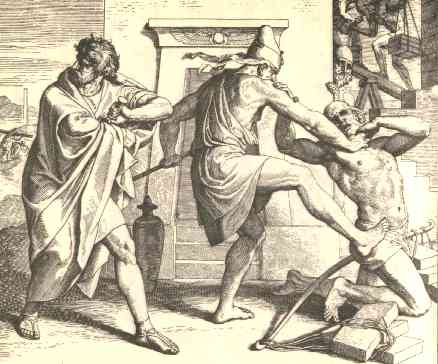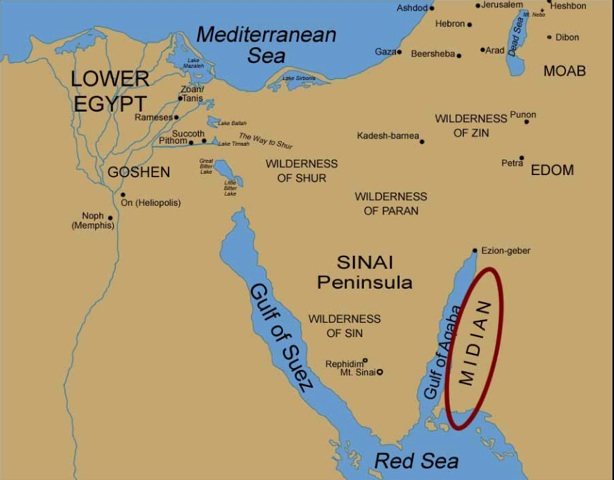© 2003; 2014
Fellowship at Cross Creek
Life of Moses
Lesson 7: Overcoming the Excuses…
Ex 4:1-17
(1.12.03; 9.21.14)
Introduction…Over the years, I have come to the conclusion that perhaps one of the biggest obstacles to anyone’s Spiritual growth is the insecurity to risk the attempt or responsibility to lead others… be it one’s marriage, family, Sunday School class, Bible study or just about anything in life that involves others. I have seen it over and over again. Sheep without a shepherd. Great sheep. Talented sheep, and yet none of the sheep takes it upon themselves to risk shepherding or leading the other sheep in the very real need that needs to be met or the assignment that needs to be carried out. Someone take charge. Someone risk leadership, even imperfect leadership…even the complaints and grips of others. Seen a family or marriage without a leader? … Tragic. Seen a Bible study, small group or ministry project without a leader? … No direction.
Now you can’t be a jerk…I mean… all the time…and be a good leader as well. Sometimes the kids think mom or dad are jerks, we all understand this, but good leaders are teachable…trainable. They want to become better leaders, not so much for their own personal glory in leading, but to get the task done and done right, and this involves people…it involves a wise, expedient expenditure or allocation of time, manpower and resources.
What can I say? People need leadership. Not necessarily dictators, but definitely leadership…leadership and responsibility. Good leaders are willing to face their insecurities to become a better leader in order to meet the need or get the assigned task done.
And bottom line…no leadership risked, Spiritual growth and maturity, I promise you is arrested. NO WAY around it. Even servants must eventually risk leadership.
So how does this relate to kids or students? I think a good teacher or leader seeks to identify, encourage and equip others, including students, to own the process of meeting the need or accomplishing the assigned task, as well as, constantly meeting the need or accomplishing the assigned task better. In other words, a leader seeks to build leaders. It is this easy? Heck, no. There are lots of pitfalls and nuances that must be navigated, but are we just teaching children for the sake of teaching or are we equipping students to think, lead and make difficult, complex and morally courageous decisions? What is our ultimate goal?
If I was exposing this study to children, I would probably attempt to get them to recognize a moment in time in which the kids interpreted a moment when a situation needed leadership and NO ONE stood up to the plate? Or perhaps, I would get them to talk about moments in which they felt someone was being too bossy and why? Now contrast that with a situation in which there was no direction? Where’s the balance? Why didn’t they step up to the plate? Why don’t most people? Just get them thinking about the concept of leadership and why many are fearful to risk its desperate plea.
Life of Moses’ General Introduction: You make a mistake; you think your life has changed forever; that there is no going back. In exile, you take your flock of sheep, which you have been pasturing for the past forty years, to an out-of-the-way desert valley that seems to symbolize your life. You see a fire in the distance that refuses to die. You decide to take a closer look. As you draw closer to the inextinguishable flame, suddenly your life does change forever…
The God of the universe has plucked YOU, out of all people, a wandering shepherd, to lead your entire nation, numbering well over two million people out of the country where they are currently enslaved, across a barren wasteland with little water or food resources, to a land which their forefathers had previously shepherded their flocks for a seemingly brief three hudred years, but has been now been abandoned for over four hundred years and is currently occupied by inhabitants who have no intention of giving that land back up to their forefathers’ descendents.
Impossible you say? Ridiculous? Sounds like it to me, unless the God of creation is the one doing the calling and doing the work. Do you have the guts to be obedient no matter what…no matter the price?
Pray
Read the Passage two or three times…
Ask questions…
Exod. 4:1 Moses answered,
“What if they do not believe me or listen to me and say, `The LORD did not appear to you’?”
Who is they? The elders of Israel? The Egyptians? Believe about what? That it was God or I AM or the LORD sending him to lead the children of Israel (or Jacob) out of Egypt and slavery? This is a great question. I would be asking it. Who would believe him?
2 Then the LORD said to him,
“What is that in your hand?”
“A staff,” he replied.
Why a staff? Was it because it was just convenient? Or was the particular tool of validation that God wanted to use? A staff to shepherd sheep. Fend off wild animals? Count sheep? Gently nudge or guide them? Lean on?
3 The LORD said, “Throw it on the ground.”
Moses threw it on the ground
and it became a snake,
and he ran from it.
How did God do this? How does God transform a wooden staff into a living snake? Was the snake hissing at him? Was it a dangerous snake? I still jump at snakes. This does come across as a bit humorous as Moses runs from his staff-transformed-into-a-snake.
4 Then the LORD said to him,
“Reach out your hand
and take it by the tail.”
So Moses reached out
and took hold of the snake
and it turned back into a staff in his hand.
That took courage. Why the tail? I would rather take hold of it right behind the head, so that it could not bite me. And yet, I watch snake handlers grab the tail, and then use a stick about half way down the snake’s body? How is God doing this…changing the snake back into his staff and vice versa?
5 “This,” said the LORD,
“is so that they may believe that the LORD,
the God of their fathers
–the God of Abraham, the God of Isaac
and the God of Jacob
–has appeared to you.”
Proof. Validation. Would they think this trickery? Only something God or a god could do?
6 Then the LORD said,
“Put your hand inside your cloak.”
So Moses put his hand into his cloak,
and when he took it out,
it was leprous, like snow.
Did this scare or frighten Moses? Is this what leprosy look like? Like snow?
7 “Now put it back into your cloak,” he said.
So Moses put his hand back into his cloak,
and when he took it out,
it was restored,
like the rest of his flesh.
Moses had to be shocked.
8 Then the LORD said,
“If they do not believe you
or pay attention to the first miraculous sign,
they may believe the second.
Makes sense, but would they still think it gimmickry?
9 But if they do not believe these two signs
or listen to you,
take some water from the Nile
and pour it on the dry ground.
The water you take from the river
will become blood on the ground.”
A third sign. It’s as if God expects Israel’s skepticism or lack of trust in Moses. And yet, God can do anything as he is about to do. He is sparing no price at accomplishing his promise or objective of placing Abraham’s descendants back into their forefathers’ promised lands. God is keeping his word. And this is only a small token of the miracles or supernatural that he is about to perform.
10 Moses said to the LORD,
“O Lord, I have never been eloquent,
neither in the past
nor since you have spoken to your servant.
I am slow of speech and tongue.”
Another obstacle anticipated. So despite three signs, Moses is still insecure. Does he mean that he is struggling even just communicating to God at the bush? Why was this important to Moses? Even then did leadership seem to require a mastery of words?
11 The LORD said to him,
“Who gave man his mouth?
Who makes him deaf or mute?
Who gives him sight or makes him blind?
Is it not I, the LORD?
Why or how does God do this—make one blind and one not? Or is it that he simply allows the laws of genetic and disease run their courses?
12 Now go; I will help you speak
and will teach you what to say.”
God has answered his objection. I will do it for you. If I can turn a stick into a snake, and water into blood.
13 But Moses said,
“O Lord, please send someone else to do it.”
Despite everything God has equipped him with, Moses still hesitates. It doesn’t surprise me. Moses still struggles. Why was he so afraid? Was his speech (such as the king’s speech in the film the King’s Speech) this bad? Did he stutter? Why would God use or allow his servant to be such a poor communicator? What was he afraid of? Would people laugh or not take him seriously? Is Moses really still asking out of the whole project?
14 Then the LORD’s anger burned against Moses
and he said, “What about your brother, Aaron the Levite?
I know he can speak well.
He is already on his way to meet you,
and his heart will be glad when he sees you.
God seems to have had enough of Moses’ excuses. Why was Aaron already on his way to meet Moses? Had God put something on Aaron’s heart to go to Moses? Had God planned this anyway? Why did he become angry at Moses, if Aaron was already coming? Or had God picked Aaron for a different supporting role, but not a primary mouth-piece role? When it says that God’s anger burns, just how mad is God? Is he really mad? Impatient? Or is Moses really pushing the envelope here?
15 You shall speak to him
and put words in his mouth;
I will help both of you speak
and will teach you what to do.
So Moses will speak after all? But Aaron will be the primary mouth piece?
16 He will speak to the people for you,
and it will be as if he were your mouth
and as if you were God to him.
What an interesting expression—“God to him.” Moses would carry this much influence?
17 But take this staff in your hand
so you can perform miraculous signs with it.”
(Note: for a change of pace, sometimes try skimming the passage looking for nouns or naming words, then verbs or action words, or color words such as adjective or adverbs. Or look for stated questions or commands. Don’t get caught up in perfection either. Remember, the goal is to use any legitimate observing device to read or skim through the passage enough times that the student becomes more and more familiar with the passage and its narrative or argument. The more you observe the passage, the better will be your interpretation of the passage, and the better your interpretation of the passage, the better your application of the passage’s embedded truths or meanings.)
Who’s? Moses, the LORD, they, Abraham, Isaac, and Jacob, man, who makes…who gives…I, the LORD, someone else, your brother, Aaron the Levite, the people,
Where’s? on the ground, inside your cloak, from the Nile, on the dry ground, on his way, in his mouth, in your hand
When’s? then the Lord, then the Lord said, then the Lord said, and when he took it out, in the past, nor since, then the Lord’s anger, already on his way, when he sees you
What’s?
• (Review) vv. 1-11 God calls Moses for the mission of his life—to deliver the people of Israel from Egypt and to take them back to the land, which was promised their forefathers.
• (Review) vv. 12-22 God not only answers Moses question that he will be with him to help him accomplish the mission God has given him, he tells him his eternal name and gives him the message he is to take of freedom for Israelites from the Egyptians via God’s mighty hand. They will also not leave empty-handed.
• 4:1-17…
• Moses asks another question, “What if they don’t believe me?” v. 1
• The LORD gives him three signs:
a) his staff that turn into a snake and back 2-5
b) his hand turns to leprosy and back 6-8
c) water from the Nile River turning to blood 9
• But this is still not enough for Moses; he informs the LORD that he is not an eloquent speaker. v. 10.
• The LORD reassures Moses that he is capable of handling this and helping Moses. Vv. 11-12.
• But Moses protests and still asks for the LORD to send someone else. V. 13.
• Though the LORD becomes angry, he gives him his brother Aaron, to help him speak. Vv. 14-16
• He reminds him to take the staff; it will be the tool that God will perform his miracles through Moses. V. 17.
Summary…3:1-11: God calls Moses for a special mission; 3:12-22: God tells Moses he will not go alone and gives Moses God’s special name, I AM.
4:1-17: But Moses, still fearful, asks about two problems: 1) what if the leaders of Israel don’t believe me? And 2) what about my lack of eloquence?
God answers both of these concerns: 1) along with two other signs, your staff will be a special staff that will manifest God’s powers; 2) Your brother Aaron will speak for you.
Bottom line…I am not sending you back to your people empty handed. I am giving you a special powers and your brother Aaron’s voice.
Note: Despite all this, Moses still does not seem secure or desiring of this call.
Special Note on the term “LORD”: Notice that I AM WHO I AM as well as LORD are in all caps in the NIV. Why is this?
The reason for this is that both phrases or words are one in the same. LORD in all caps becomes a substitute for I AM (or Yahweh, pronounced Yah-way in Hebrew) for God’s personal name. That is why we call him LORD. When “Lord” is not in all caps, it is the Hebrew word for “master” (adonai).
Why LORD for I AM? Good question. Because God’s personal name, I AM or Yahweh, was considered sacred and not to be taken in vain (Ex 20, one of the ten commandments), scribes substituted the vowels for “Lord or master” (adonai) underneath the consonants for the Yahweh (I AM) within the biblical text since there were no vowels to begin with (Jews did not need them; we did). Rabbi’s knew they were to substitute “adonai,” Lord, for “Yahweh,” I AM, thus not profaning the LORD’s name. But what we, later readers did was to come up with an entirely new word, one that did not really exist, one that combines the consonants of Yahweh with the vowels of adonai–Jehovah.
In fact, for the most part, I will seldom use it. It does not really exist. We have made it up. Either use LORD (Yahweh, I AM ) or Lord (adonai, master or Lord).
So now you know why LORD is in all caps. Remember it stand for I AM or Yahweh, God’s personal name, just like my personal name is Joe or Joseph.
Whys? What do I learn about God? Life? People? Myself?
• God can do anything. Nothing stops him. He has no limitation, even turning water into blood or wood into a snake.
• Humans, even God’s servants, initially can be very insecure, not only doubting God’s call upon their lives, but their ability to truly accomplish the task God is giving them to do.
• In human terms, God can and does become impatient with our doubting his provision for the task ahead.
• God is not afraid to answer all our fears/requests, nor to give us the power, truth and tools we need to accomplish the job.
• In the end, God can and does direct man, including his mouth, ears and eyes, including his being deaf, mute and blind.
• God uses what we have as his tools.
• God can use our families to help us, as Aaron with Moses (not that there weren’t problems. In fact, there were.)
• God was already providing the answer to Moses’ rebuttals in Aaron’s coming to Moses before Moses had even brought up his speech impediment.
So What’s? (Prayerfully connect a specific personal struggle to one of the above truths or principles and be willing to share or confess it with the group.)
2003 Application…
This Week’s struggle: I started off strong, but in the middle of the week, along with Jordan, I started watching the DVD of 24, a television series that allegedly takes place in a real time of 24 hours. It was so addicting–like a book that you can’t put down. Each episode—an hour—ended as a cliff-hanger, so it was hard to STOP watching it! Once you were finished with one DVD or episode, you wanted to go on to the next to see how the previous cliff-hanger was resolved. So I watched the entire 24 hours–actually about 16 hours (commercials had been edited out). Needless to say this really shot my productivity at the time. While it was fun, I fell behind, lost sleep and am not feeling well right now, and all this with a lot to do, as the weekend is coming up.
Principle/Application: Despite all that God attempts to provide us with to do the job, we can still doubt that he can help or resource ME to do it.
Can God get me through the next 36 hours? In fact, quite often, my life does seem like a 24 hour drama, especially as each weekend arrives.
God can do anything. I only need to be sensitive to the tools and support he provides and walk in faith. He will give me the illustration, examples, editing and rehearsal I need to finish preparing my teaching.
And in my various meetings, draw from the people God has brought me. Pull the answers from them. Empower them. In other words, everyday, be aware of God’s answers and resources as I am living out my life’s drama.
2014 Application…
Thanksgiving…I have young adults whom either I remember being born or knew shortly after they were born, independently coming to me saying I see a ministry need and I am not only willing to meet that need but am willing to lead it, if called upon. Tell me, who gets to see fruit like this in a lifetime of ministry? I am blessed beyond measure!
And guess what? After a stressful and sustained drought, the Fall rains have returned. Something symbolic here, if you ask me.
Struggle…an irritating fly in my joyful ointment, or perhaps as the “Beloved” cries out to her “Lover” in the Song of Songs, Catch the foxes for us, the little foxes, that ruin the vineyard—for our vineyard is in floom bloom (Song of Songs 2:15).
After seemingly a good, long run of not really having to think too deeply about finances—which has NOT been the case in previous years—we came up somewhat short here recently. It kind of caught me by surprise. My real concern is whether there is a gradual trend in which our financial output has been exceeding our financial input and that trend is just now getting exposed. We shall see.
Truth…There are a thousands reasons something seemingly impossible will or cannot work, and yet if God calls for it to be done, and for whatever purpose, he can and will provide the resources, tools, truth and power necessary to accomplish or bring about his divinely-inspired decree or will. And despite all our seemingly reasonable human objections, there comes a point in time when the only alternative left to us is to merely trust God and step out in faith. And if God wants it done; He will do it. We are just the tools. And if he wants it done immediately, it will occur immediately, and if not, it will take longer, and longer is okay, maybe even better, because over time, it builds a stronger, more sustainable Spiritual confidence, faith, trust, backbone and relationship with our Creator…as opposed to miracles, that come and go so quickly, that as time goes by, we are tempted to question Why is God Not working in the same way as he did in the miracle?
Note: I have seen people step out in denial. In other words, it was NOT trust in God, but their own selfish denial. And how do I know this? 1) long-term fruit or the lack thereof, and 2) they failed to take advantage of all the Spiritually supportive checks and balances that Scripture provided for them within the local church because God, it seemed was only talking to them…in a room of not just cold-hearted saints, but very godly men and women that just as passionately sought the will of God as well.
This is not to say that God can’t or doesn’t call out the individual, as in the case of Moses, here (although Moses does have Aaron), or perhaps a Joan or Arc (France) or Gideon (Judges) or Christ himself, to go against the general public or cultural grain, and in so doing, establish a new Spiritual direction, trend or paradigm. But in those cases, history or Scripture usually makes it clear, that those surrounding the individual being led or called by God are NOT sincerely seeking the LORD as well.
In the cases I am referring to, there are no checks and balances, and the person who is advocating that they are being led or called upon by God to do something special can’t even answer some basic motivational whys or validation of God’s direction. In this case, God over-abundantly validates Moses’ call and leading, and in fact, it is Moses who doubts the call. And in fact, I would probably be much more willing to listen to or trust someone WITH a speech or some other impediment who inwardly probably doesn’t want to do what they or others feel God is calling them to do.
Application…Stick to the present general trend or course. I have been doing this a long time…listening to, sensing and courageously seeking to be obedient to God’s leading within my life. I feel fairly confident of the message he is giving me now, and the human resources (or Aarons) certainly seem to be stepping up to the plate and validating this direction. Stick to the course and message…Boots on the Ground…regardless of the proverbial flies in the ointment or annoying little foxes that will seek to ruin the crop. And what does Boots on the Ground mean? More to come…It’s a metaphor for where I believe God is leading or taking our Spiritual family. Time will tell. It always does.
Your struggle?
Principle/Prayerful application?
What about your students? What are some of their current struggles?
Which principles seem to relate?
How could God prayerfully apply these truths to their lives? (Just try a few in your preparation…then try leading the application in that direction. It may go another direction. Be sensitive to God’s leading among the group.)
Scripture quotations, unless noted otherwise, are taken from the Holy Bible: New International Version‚ NIV‚ Copyright 1973, 1978, 1984, International Bible Society. Used by permission of Zondervan Bible Publishers. All rights reserved.






